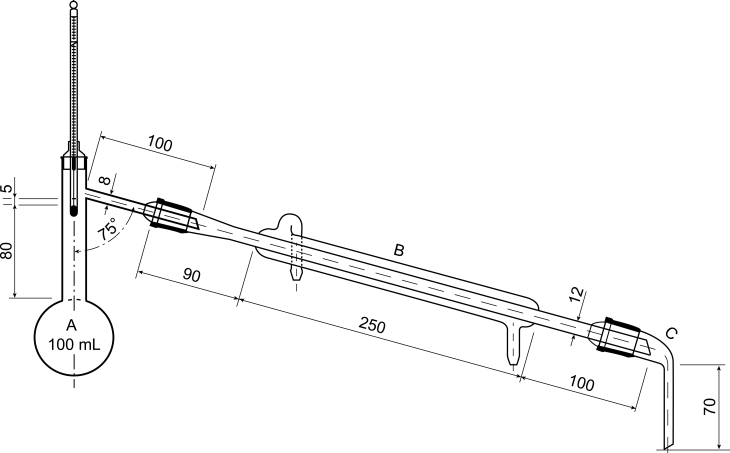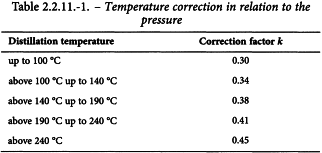Appendix V C. Determination of Distillation Range
The distillation range is the temperature interval, corrected for a pressure of 101.3 kPa, within which a liquid or a specified fraction of a liquid, distils under the following conditions.
Apparatus The apparatus (see Figure 2.2.11.-1) consists of a distillation flask (A), a straight tube condenser (B) which fits on to the side arm of the flask and a plain-bend adaptor (C) attached to the end of the condenser. The lower end of the condenser may, alternatively, be bent to replace the adaptor. A thermometer is inserted in the neck of the flask so that the upper end of the bulb is 5 mm lower than the junction of the lower wall of the lateral tube. The thermometer can be read to the nearest 0.2 °C and covers a range of at least 50 °C. During the determination, the flask, including its neck, is protected from draughts by a suitable screen.
Method Place in the flask (A) 50.0 mL of the liquid to be examined and a few pieces of porous material. Collect the distillate in a 50 mL cylinder graduated in millilitres. Cooling by circulating water is essential for liquids distilling below 150 °C. Heat the flask so that boiling is rapidly achieved and note the temperature at which the first drop of distillate falls into the cylinder. Adjust the heating to give a regular rate of distillation of 2-3 mL/min and note the temperature when the whole or the prescribed fraction of the liquid, measured at 20 °C, has distilled.
Correct the observed temperatures for barometric pressure by means of the formula:
t1 | = | the corrected temperature, |
t2 | = | the observed temperature, at the barometric pressure b, |
k | = | the correction factor taken from Table 2.2.11.-1 unless the factor is given, |
b | = | the barometric pressure, expressed in kilopascals, during the distillation. |


